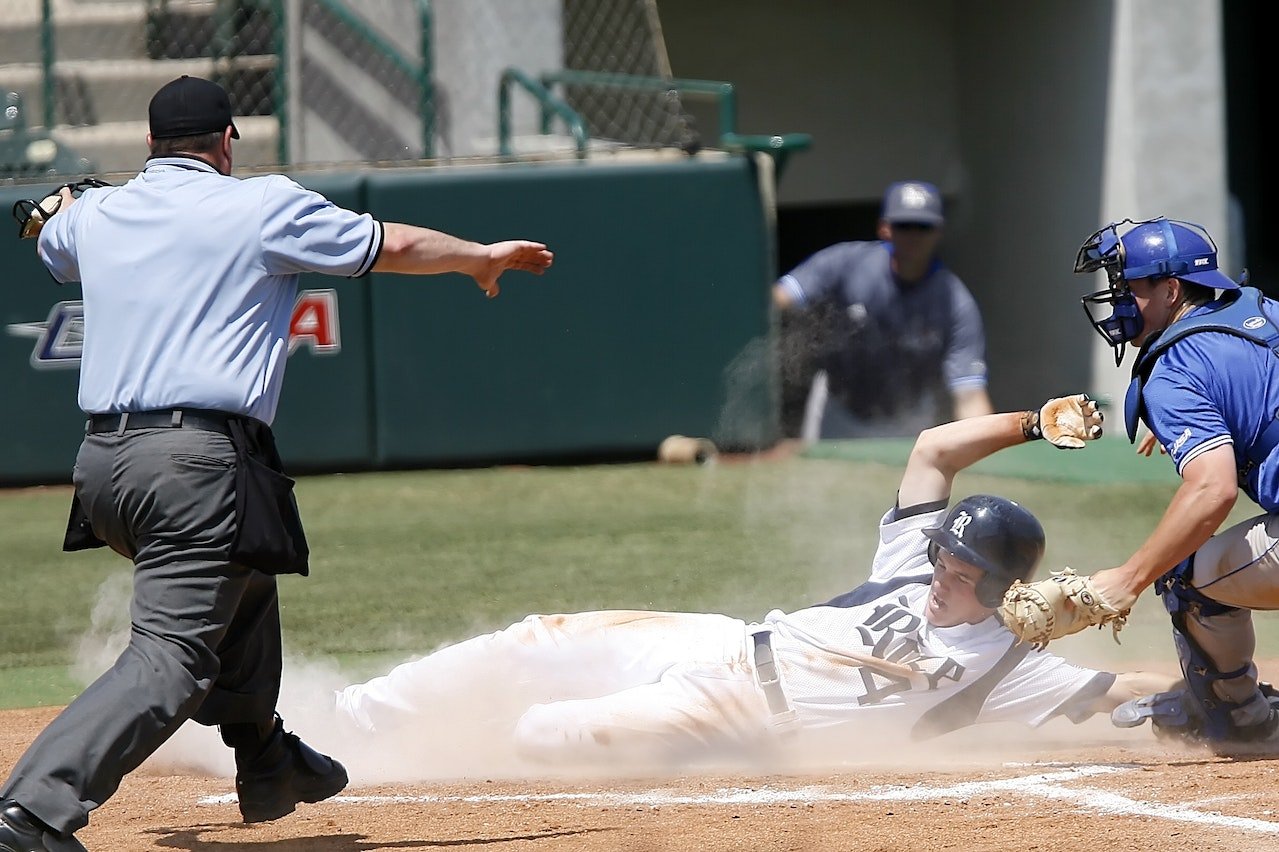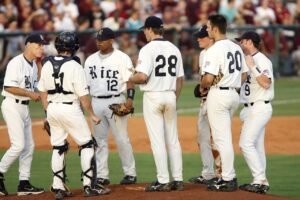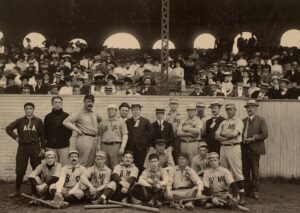In the world of professional baseball, with its rich history and passionate fan base, disputes over player conduct violations can often spark heated debates and intense scrutiny. As the public’s demand for accountability and ethical behavior from athletes continues to grow, baseball teams find themselves faced with the challenge of addressing such instances in a fair and effective manner. This article explores the various approaches and strategies employed by baseball teams when it comes to handling disputes over player conduct violations. From internal investigations to player suspensions and community outreach programs, discover how these teams navigate the complex world of player conduct violations and work towards maintaining the integrity of the game.
Code of Conduct Policies
Baseball teams recognize the importance of maintaining a positive and respectful environment both on and off the field. To ensure that players adhere to certain standards, teams have implemented comprehensive Code of Conduct Policies.
Written Policies
The first step in handling player conduct violations is to have clearly written policies in place. These policies outline the behavior expected from players, coaches, and staff members. By clearly communicating these expectations, everyone involved in the baseball organization understands the standards they are required to meet.
Communicating Expectations
In addition to written policies, baseball teams prioritize effective communication to ensure that everyone comprehends the conduct expectations. Regular meetings and training sessions are conducted to remind players of the team’s code of conduct and the consequences of violating it. This open dialogue helps to foster a supportive and respectful team environment.
Enforcement and Consequences
Once the conduct policies are established and well-communicated, it is crucial to enforce them consistently and fairly. Baseball teams have enforcement processes in place to investigate and address conduct violations promptly. These processes include disciplinary measures, such as verbal warnings, written warnings or reprimands, fines, suspension, and, in severe cases, termination.
Internal Investigation Process
When a conduct violation is reported or observed, baseball teams employ a robust internal investigation process to gather all the relevant information before making any determinations.
Receiving Reports
Reports of conduct violations may come from various sources, including teammates, coaches, staff members, or even external parties. Baseball teams encourage individuals to report conduct violations promptly to ensure a timely response.
Gathering Information
To conduct a thorough investigation, teams gather all available information related to the reported conduct violation. This may include statements from witnesses, relevant documents, and any other evidence that can contribute to a comprehensive understanding of the situation.
Interviewing Involved Parties
Baseball teams ensure that all involved parties, including the alleged offender and any potential witnesses, are interviewed as part of the investigation process. These interviews provide an opportunity for individuals to share their perspectives and contribute to the overall investigation.
Reviewing Evidence
After interviews are conducted and information is gathered, teams review all the evidence meticulously. By analyzing the evidence objectively, teams aim to make fair and informed determinations about whether a conduct violation has occurred.
Making Determinations
Based on the information collected and the evidence reviewed, baseball teams make determinations regarding the validity of the reported conduct violation. It is crucial for teams to make these determinations objectively and without bias, ensuring that the outcome is fair and just.
Disciplinary Measures
In cases where a player is found to have violated the code of conduct policies, baseball teams employ various disciplinary measures to address the behavior appropriately.
Verbal Warnings
For minor violations or first-time offenses, teams may choose to issue a verbal warning to the player involved. Verbal warnings serve as a reminder of the expected behavior and the consequences that may follow if the behavior persists.
Written Warnings or Reprimands
If the conduct violation continues or if it is more severe, baseball teams may issue a written warning or reprimand to the player. This formalizes the disciplinary action taken and provides a documented record to ensure accountability.
Fines
In some instances, baseball teams may impose fines on players as a disciplinary measure for conduct violations. These fines may be monetary or non-monetary in nature, depending on the severity and impact of the violation.
Suspension
For more serious conduct violations, baseball teams may impose temporary suspensions on players. This allows the team and the player involved to reflect on the behavior and its consequences while also serving as a deterrent to future misconduct.
Termination
In cases where a player’s conduct violations are severe or repeated, the ultimate disciplinary measure may involve terminating their contract with the team. This decision is made after careful consideration of all the relevant factors and the impact on the team’s culture and reputation.
Player Union Involvement
Within the realm of professional baseball, player unions play a significant role in handling disputes over player conduct violations. These unions negotiate collective bargaining agreements (CBAs) that outline the rights and responsibilities of players, as well as the procedures for resolving disputes.
Collective Bargaining Agreements
Collective bargaining agreements are negotiated between player unions and team ownership to establish the rules and guidelines under which players will operate. These agreements typically include provisions related to conduct expectations and the process for handling conduct violations.
Grievance Procedures
In the event of a dispute over a player conduct violation, player unions may initiate the grievance procedures outlined in the collective bargaining agreement. These procedures provide a structured framework for resolving disputes through negotiation and, if necessary, arbitration.
Arbitration Process
When disputes cannot be resolved through negotiation, player unions and team ownership may turn to arbitration. An impartial arbitrator evaluates the evidence and arguments presented by both parties and renders a decision that is binding for both sides. The arbitration process helps to ensure a fair and objective resolution to the dispute.
Legal Considerations
Dealing with player conduct violations also involves navigating potential legal implications and considerations.
Contractual Obligations
Baseball teams must consider the contractual obligations outlined in players’ contracts when addressing conduct violations. These obligations could impact the team’s ability to discipline players and may require consultation with legal counsel to ensure compliance with all contractual provisions.
Public Relations Impact
Player conduct violations can have significant public relations implications for baseball teams. Teams must carefully manage the release of information to the public and media to protect their brand image and maintain the trust and support of fans.
Possible Criminal Charges
In certain cases, player conduct violations may result in criminal charges. Baseball teams must cooperate with law enforcement authorities during any criminal investigations and carefully consider the potential legal consequences for both the player and the team.
Consultation with Legal Counsel
Given the legal complexities involved in handling player conduct violations, baseball teams often seek guidance from legal counsel throughout the process.
Evaluating Legal Risks
Legal counsel helps teams evaluate the potential legal risks associated with the conduct violation and the proposed disciplinary measures. This includes assessing contractual obligations, potential legal claims, and the impact of any legal actions on the team’s reputation.
Advising on Course of Action
Based on their expertise, legal counsel provides advice and recommendations to baseball teams regarding the appropriate course of action to address the conduct violation. This ensures that the team’s actions align with legal requirements and minimize potential legal liabilities.
Negotiating Settlements
In some cases, legal counsel may assist in negotiating settlements with the player or their representation. These settlements may address any legal claims resulting from the conduct violation and help the team and the player reach a mutually agreeable resolution.
Media Management
How baseball teams manage the media during player conduct violations is crucial to controlling the narrative and minimizing damage to the team’s reputation.
Press Statements
Baseball teams issue press statements to provide a concise and accurate account of the conduct violation and the steps being taken to address it. These statements aim to ensure transparency and assure the public that the organization is taking the matter seriously.
Controlling Information Release
To maintain control over the narrative, teams carefully manage the release of information related to player conduct violations. By limiting leaks and ensuring accurate information dissemination, teams can protect the privacy of the individuals involved while keeping the public informed.
Damage Control
In the event of significant media scrutiny or negative public perception resulting from a conduct violation, teams engage in proactive damage control. This may involve arranging media interviews, issuing additional statements, or implementing public relations strategies to rebuild trust and mitigate reputational harm.
Reputation Management
When player conduct violations occur, baseball teams must actively manage their reputation to maintain public trust and support.
Impact on Team Brand
Player conduct violations can have a direct impact on a team’s brand image. To protect the team’s reputation, baseball organizations work diligently to prevent and address conduct violations promptly to ensure their brand remains associated with values of integrity and respect.
Public Perception
The way baseball teams handle player conduct violations greatly influences public perception. By demonstrating a commitment to addressing conduct violations seriously and transparently, teams can help maintain public trust and support.
Rebuilding Trust
When a player’s conduct violation causes harm to the team’s reputation, a concerted effort is made to rebuild trust with fans, sponsors, and other stakeholders. This may involve community outreach programs, charitable initiatives, and other acts that demonstrate the team’s commitment to ethical behavior.
Rehabilitation Programs
Baseball teams recognize that some conduct violations may be the result of underlying issues and provide rehabilitation programs to support players in overcoming personal challenges.
Counseling and Therapy
Teams offer counseling and therapy services to players involved in conduct violations. These sessions help players address any emotional or psychological issues that may have contributed to their misconduct and equip them with the tools to make positive changes in their lives.
Anger Management
For players struggling with anger-related conduct violations, baseball teams provide specialized anger management programs. These programs aim to help players identify triggers, develop coping mechanisms, and learn healthier ways of expressing and managing their emotions.
Substance Abuse Treatment
In cases where conduct violations are related to substance abuse, baseball teams offer professional treatment programs to help players overcome addiction and develop healthier lifestyles. These programs often include support from qualified addiction counselors, regular drug testing, and ongoing monitoring.
Education and Training
To prevent future conduct violations, baseball organizations prioritize player education and training programs. These programs focus on promoting positive behavior, emphasizing the importance of respect and teamwork, and raising awareness about the potential consequences of misconduct.
Ongoing Monitoring
Even after addressing a conduct violation, baseball teams understand the importance of ongoing monitoring to identify any potential recurring issues.
Regular Check-Ins
Teams conduct regular check-ins with players involved in conduct violations to evaluate their progress and identify any ongoing challenges. These check-ins provide players with continued support and monitor their behavior to ensure compliance with the team’s code of conduct.
Performance Evaluation
Player performance evaluations take into account both on-field performance and adherence to the team’s conduct expectations. These evaluations help teams assess any progress made by players and inform decisions related to playing time and future contracts.
Behavior Assessments
Baseball teams may engage experts or professionals to conduct behavior assessments of players involved in serious conduct violations. These assessments help to evaluate the player’s behavior patterns, identify any potential risks or underlying issues, and recommend appropriate interventions to prevent future misconduct.
In conclusion, baseball teams have robust processes and policies in place to handle disputes over player conduct violations. By establishing comprehensive Code of Conduct Policies, conducting thorough internal investigations, implementing disciplinary measures, involving player unions, considering legal implications, and focusing on reputation management and rehabilitation programs, teams strive to ensure a positive and respectful environment both on and off the field. Through ongoing monitoring and a commitment to continuous improvement, baseball organizations aim to foster a culture of accountability, integrity, and personal growth for all individuals involved in the sport.




